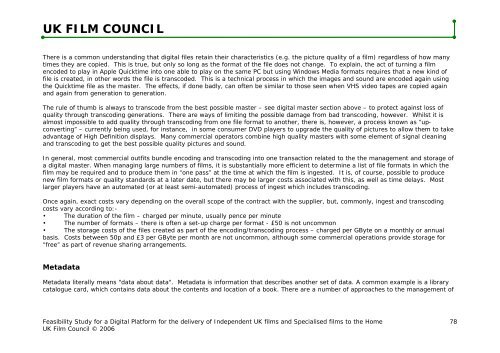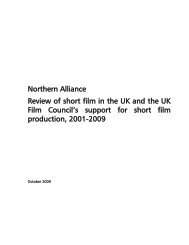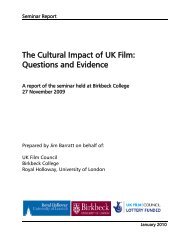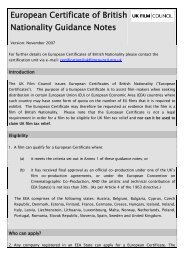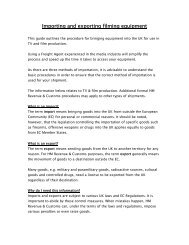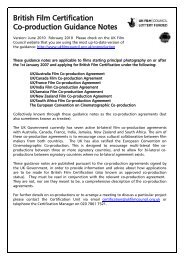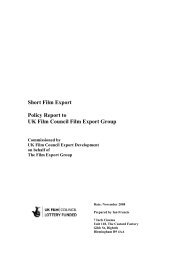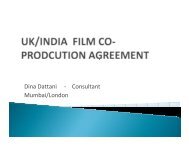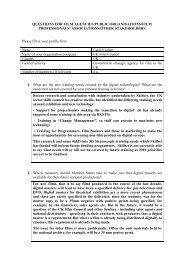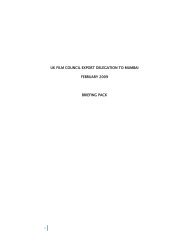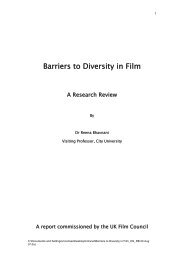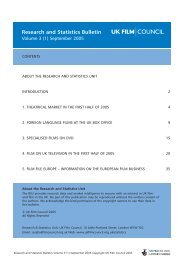Feasibility Study of a Digital Platform for the delivery of UK ... - BFI
Feasibility Study of a Digital Platform for the delivery of UK ... - BFI
Feasibility Study of a Digital Platform for the delivery of UK ... - BFI
Create successful ePaper yourself
Turn your PDF publications into a flip-book with our unique Google optimized e-Paper software.
<strong>UK</strong> FILM COUNCIL<br />
There is a common understanding that digital files retain <strong>the</strong>ir characteristics (e.g. <strong>the</strong> picture quality <strong>of</strong> a film) regardless <strong>of</strong> how many<br />
times <strong>the</strong>y are copied. This is true, but only so long as <strong>the</strong> <strong>for</strong>mat <strong>of</strong> <strong>the</strong> file does not change. To explain, <strong>the</strong> act <strong>of</strong> turning a film<br />
encoded to play in Apple Quicktime into one able to play on <strong>the</strong> same PC but using Windows Media <strong>for</strong>mats requires that a new kind <strong>of</strong><br />
file is created, in o<strong>the</strong>r words <strong>the</strong> file is transcoded. This is a technical process in which <strong>the</strong> images and sound are encoded again using<br />
<strong>the</strong> Quicktime file as <strong>the</strong> master. The effects, if done badly, can <strong>of</strong>ten be similar to those seen when VHS video tapes are copied again<br />
and again from generation to generation.<br />
The rule <strong>of</strong> thumb is always to transcode from <strong>the</strong> best possible master – see digital master section above – to protect against loss <strong>of</strong><br />
quality through transcoding generations. There are ways <strong>of</strong> limiting <strong>the</strong> possible damage from bad transcoding, however. Whilst it is<br />
almost impossible to add quality through transcoding from one file <strong>for</strong>mat to ano<strong>the</strong>r, <strong>the</strong>re is, however, a process known as “upconverting”<br />
– currently being used, <strong>for</strong> instance, in some consumer DVD players to upgrade <strong>the</strong> quality <strong>of</strong> pictures to allow <strong>the</strong>m to take<br />
advantage <strong>of</strong> High Definition displays. Many commercial operators combine high quality masters with some element <strong>of</strong> signal cleaning<br />
and transcoding to get <strong>the</strong> best possible quality pictures and sound.<br />
In general, most commercial outfits bundle encoding and transcoding into one transaction related to <strong>the</strong> <strong>the</strong> management and storage <strong>of</strong><br />
a digital master. When managing large numbers <strong>of</strong> films, it is substantially more efficient to determine a list <strong>of</strong> file <strong>for</strong>mats in which <strong>the</strong><br />
film may be required and to produce <strong>the</strong>m in “one pass” at <strong>the</strong> time at which <strong>the</strong> film is ingested. It is, <strong>of</strong> course, possible to produce<br />
new film <strong>for</strong>mats or quality standards at a later date, but <strong>the</strong>re may be larger costs associated with this, as well as time delays. Most<br />
larger players have an automated (or at least semi-automated) process <strong>of</strong> ingest which includes transcoding.<br />
Once again, exact costs vary depending on <strong>the</strong> overall scope <strong>of</strong> <strong>the</strong> contract with <strong>the</strong> supplier, but, commonly, ingest and transcoding<br />
costs vary according to:-<br />
• The duration <strong>of</strong> <strong>the</strong> film – charged per minute, usually pence per minute<br />
• The number <strong>of</strong> <strong>for</strong>mats – <strong>the</strong>re is <strong>of</strong>ten a set-up charge per <strong>for</strong>mat - £50 is not uncommon<br />
• The storage costs <strong>of</strong> <strong>the</strong> files created as part <strong>of</strong> <strong>the</strong> encoding/transcoding process – charged per GByte on a monthly or annual<br />
basis. Costs between 50p and £3 per GByte per month are not uncommon, although some commercial operations provide storage <strong>for</strong><br />
“free” as part <strong>of</strong> revenue sharing arrangements.<br />
Metadata<br />
Metadata literally means "data about data". Metadata is in<strong>for</strong>mation that describes ano<strong>the</strong>r set <strong>of</strong> data. A common example is a library<br />
catalogue card, which contains data about <strong>the</strong> contents and location <strong>of</strong> a book. There are a number <strong>of</strong> approaches to <strong>the</strong> management <strong>of</strong><br />
<strong>Feasibility</strong> <strong>Study</strong> <strong>for</strong> a <strong>Digital</strong> <strong>Plat<strong>for</strong>m</strong> <strong>for</strong> <strong>the</strong> <strong>delivery</strong> <strong>of</strong> Independent <strong>UK</strong> films and Specialised films to <strong>the</strong> Home<br />
<strong>UK</strong> Film Council © 2006<br />
78


